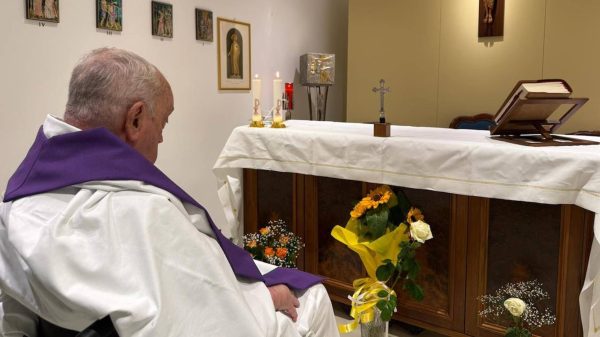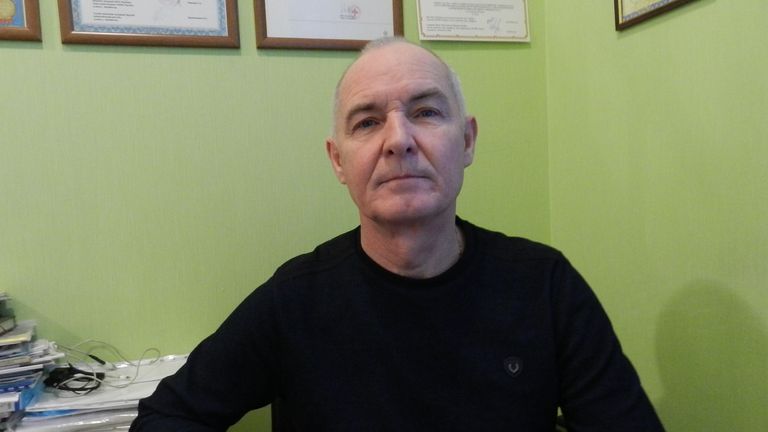Yevgen remembers how the bombs fell as the defenders made a last stand in the steelworks. “Not all of you came back.”
The situation was desperate. The medical staff treated the wounded around the clock in a bunker as soldiers outside fought against terrible odds.
Yevgen Gerasimenko was a retired medical surgeon working in Dnipro in the southeast Ukraine when Russia began its full-scale invasion last February. He defended his homeland like so many others.
The daring helicopter flight to Mariupol, which was loaded with ammunition, followed. It was planned to smuggle the man into Azovstal in order to save lives.
He spent four months in prison after the Kremlin forces took over the city and steelworks on 20 May.
Yevgen, aged 62, told Sky News exclusively in an interview to mark the anniversary of Azovstal’s surrender that “I cannot think of Azovstal” without tearing up.
A low-flying flight into Mariupol at night
He said, “Helicopters waited for us.”
Yevgen, a surgeon, was in an airport at 2am on the 31st March 2022 with two anaesthesiologists, a nurse and another fellow doctor.
The aircraft was so packed with supplies that there wasn’t enough room for passengers to sit.
We flew low, only eight to ten metres above the ground. “Sometimes I felt that we were touching the tops or trees.”
The motorboats were loaded with weapons and ammunition.
We couldn’t use any lights because it was dangerous. “We didn’t want to be seen so we used GPS to reach Azovstal.”
The docks were about an hour away from the factory. Airstrikes began as they approached the factory and lasted about three hours.
As they hid, they watched as planes dropped bombs on the metalworks. They eventually made it in.
Inside of the factory fortress
Yevgen stated, “We were constantly bombarded by the enemy.” “They attempted to hit us by air, land and water.”
Yevgen, his co-workers and he were treating 350 patients per time in the bunker.
Our medical staff was physically and mentally exhausted. “Our medical staff were physically exhausted and psychologically depressed.”
There wasn’t enough oxygen in there. “There wasn’t enough food, water or sunlight.”
Azovstal fighters lay their arms down
The defense of Mariupol is already a part of history. For weeks, the last Ukrainian soldiers held out in the ruins.
The President Volodymyr Zelenskyy then gave the order to all the remaining workers in the steelworks, to surrender.
According to Yevgen, “that command saved the lives over 2,500 people”.
After more than 80 consecutive days of fighting, the last Ukrainian fighters finally laid down their weapons on 20 May. The government hailed those who defended the steelworks as heroes.
The Ukrainians were credited for stalling Russian troops for several weeks and buying time to regroup their forces.
Click here to read more
Azovstal’s pounding – images that speak a thousand sentences
Releasing a Ukrainian prisoner-of-war reveals the torment he suffered at the hands Russians
Four Months as a Prisoner of War
After their surrender, all hopes that they would be returned to Ukraine or given rights in line with their medical status under the rules and regulations of war, were dashed.
“Russia didn’t follow the Geneva Convention.” He said that it violated every rule.
All our medical staff including military doctors and nurses were taken hostage.
Yevgen claims he was imprisoned for four months. He was taken captive on 20 May, a date he recalls because it is his wife’s birthdate. He was held prisoner until 20 September, when he was freed back into Ukrainian territory.
He said, “It is difficult to describe my feelings during that period”.
“I feel bitterness and I feel bad for the nurses and doctors who are illegally held as prisoners of war in Russian-held territories.”
Heart of Azovstal Project
Yevgen returned home. He now works at a hospital where he treats wounded soldiers.
He also promotes the Heart of Azovstal Project, an initiative started by Ukrainian billionaire Rinat Ahmetov in order to help people who have helped defend Mariupol and their families.
The project will include treatment and rehabilitation programs designed to meet diverse needs for soldiers and their families and to help them return to civilian life.
Yevgen finds it difficult to remember what happened 12 months ago. He says that if he had the chance to go back in time, he would have done it again.
“Mariupol and the Donetsk, Luhansk and Crimea regions are our homelands and we must protect them.”





















